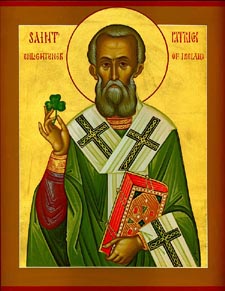|
|||
|---|---|---|---|
| This weekly bulletin insert complements the curriculum published by the Department of Christian Education of the Orthodox Church in America. This and many other Christian Education resources are available at http://dce.oca.org. | |||

The eve of Great Lent is the time when we prepare ourselves to begin the days of intensified prayer and more rigorous fasting that will lead us through the weeks to Holy Pascha. Some would say that the physical act of fasting is hard. For others, establishing and maintaining a regular practice of prayer is difficult. Yet on this day, we are asked to do the thing that may be hardest of all for many people: to forgive every person in our lives. We are asked to start on the Lenten path that will lead us to the words we sing on Pascha: "Let us...forgive all by the Resurrection." Jesus Christ never pretended that some of the things He had to do were not hard for Him. We read in Matthew's Gospel how He made it clear that going to Jerusalem was hard, because He knew what awaited Him there. He took the twelve disciples aside and told them, "Behold, we are going up to Jerusalem; and the Son of man will be delivered to the chief priests and scribes, and they will condemn him to death, and deliver him to the Gentiles to be mocked and scourged and crucified..." (20: 17-19a). Jesus also told the disciples that He would be "raised on the third day," but the miracle of the Resurrection came after the all-important words spoken on the cross, when He asked His Father to forgive those who killed Him. The Church honors a famous saint who also had to go to a hard place and had to forgive. He is the great Patrick, the Enlightener of Ireland. That is the country with which he is most closely associated, but it was not his birthplace and his early memories of it must have been recollections of hardship and cruelty. Patrick was the grandson of a priest and the son of a deacon. He was born around the year 390 and grew up in the southwestern part of Britain. He was sixteen when he first went to Ireland, and not by choice. Captured by Irish pirates, he was taken to their homeland and sold into slavery. After six years of suffering and intense homesickness, Patrick managed to escape and get back to his family. In gratitude to God he began to study to become a priest.
By the year 435, Patrick was ready, and was given his assignment: he was to go to Ireland and preach there. The idea of returning to a place where he had endured such loneliness and misery must have been hard. Worse, he would be remembered by some as a lowly runaway slave, not a priest and teacher. But Patrick was able to forgive the terrible things he associated with Ireland, and taught with love and gentleness. He lived by the words of Proverbs 3: 27: "Do not withhold good from those to whom it is due, when it is in your power to do it." |
|||
